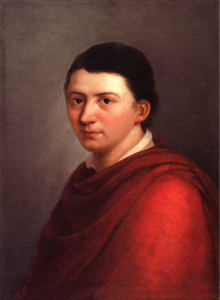The undergrowth
(Poet's title: Die Gebüsche)
Set by Schubert:
D 646
[January 1819]
Part of Schlegel: Abendröte (putative cycle)
Es wehet kühl und leise
Die Luft durch dunkle Auen,
Und nur der Himmel lächelt
Aus tausend hellen Augen.
Es regt nur Eine Seele
Sich in des Meeres Brausen
Und in den leisen Worten,
Die durch die Blätter rauschen.
So tönt in Welle Welle,
Wo Geister heimlich trauren;
So folgen Worte Worten,
Wo Geister Leben hauchen.
Durch alle Töne tönet
Im bunten Erdentraume
Ein, nur ein leiser Ton gezogen,
Für den, der heimlich lauschet.
There is a cool and gentle movement
In the air going across the dark meadows,
And only the sky smiles
From a thousand bright eyes.
Only a single soul is stirring
In the roaring of the sea,
And in the gentle words
Which are rustling through the leaves.
Thus wave echoes wave
Where spirits are secretly grieving;
Thus words follow words,
Where spirits breathe life.
Resounding amongst all the notes
In the colourful dreams of earth,
A single faint note – just one – rings out
For the person who is secretly paying attention.
All translations into English that appear on this website, unless otherwise stated, are by Malcolm Wren. You are free to use them on condition that you acknowledge Malcolm Wren as the translator and schubertsong.uk as the source. Unless otherwise stated, the comments and essays that appear after the texts and translations are by Malcolm Wren and are © Copyright.
☙
Themes and images in this text:
Air Breath and breathing Bushes and undergrowth Colour (general) Dreams The earth Eyes Fields and meadows Ghosts and spirits Heaven, the sky Leaves and foliage The sea Smiling Soul Stars Waves – Welle
It is dark in the undergrowth, particularly at sunset. The only light comes from the stars (‘a thousand bright eyes’), but we ourselves are not on the lookout. Rather the poet (‘the person who is secretly paying attention’) is all ears. It is the sounds that matter. The gentle breeze across the meadow, the roaring of the ocean, the rustling of the leaves. They all come together to create not harmony, not even melody, just a single note (‘ein leiser Ton’). Ironically, though, the result is not monotony. All of the waves, all of the words, reinforce each other (through repetition and echoes). It all reverberates in the undergrowth.
☙
Original Spelling and notes on the text Die Gebüsche. Es wehet kühl und leise Die Luft durch dunkle Auen, Und nur der Himmel lächelt Aus tausend hellen Augen. Es regt nur Eine Seele Sich in des Meeres1 Brausen, Und in den leisen Worten, Die durch die Blätter rauschen. So tönt in Welle Welle, Wo Geister heimlich trauren; So folgen Worte Worten, Wo Geister Leben hauchen. Durch alle Töne tönet Im bunten Erdentraume Ein, nur ein2 leiser Ton gezogen, Für den, der heimlich lauschet. 1 Schubert changed Schlegel's 'der Meere' (the oceans') to 'des Meeres' (the sea's) 2 Schubert added the emphatic 'nur ein' (only one) here
Confirmed by Peter Rastl with Schubert’s source, Musen-Almanach für das Jahr 1802. Herausgegeben von A. W. Schlegel und L. Tieck. Tübingen, in der Cotta’schen Buchhandlung, 1802, page 156; and with Friedrich Schlegel’s sämmtliche Werke. Erster Band. Gedichte. Berlin, bei Julius Eduard Hitzig, 1809, page 33.
To see an early edition of the text, go to page 37 [45 von 190] here: http://digital.onb.ac.at/OnbViewer/viewer.faces?doc=ABO_%2BZ20491940X


